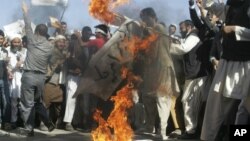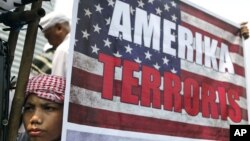ISLAMABAD —
Pakistan's government summoned a U.S. diplomat Friday, as violent demonstrations sparked by an anti-Islamic film privately produced in the United States erupted across the country. At least 13 people have been killed in the protests.
Despite calls from government and religious leaders for peaceful protests, angry demonstrators hurled rocks at riot police, pushed against metal containers blocking the roads and pulled back razor wires set up to curtail their movement. Police responded with tear gas and gunfire.
Outrage at the film in many cases turned into anger at America, which many here see as supporting the Internet video, even though the U.S. government has repeatedly stated it had nothing to do with the film. Two banks and a cinema were torched and dozens injured in the protests.
Opinion & Analysis
In the eastern city of Lahore, thousands denounced those behind the film as blasphemers, waving posters calling for their death. Some held up copies of the Quran, as others waved sticks, swords and flags and posters saying: "America destroyed world peace" and "Kill the blasphemers, cut their throats, spill their blood."
Qari Yaqoob Sheikh, one of the leaders of the Islamist Jamaat-ut-Dawa organization marching in Lahore, called on U.S. President Barack Obama to arrest those behind the production.
He says: "This is an insult, and we condemn the movie, and the American government should arrest and hang Sam Bacile and all the actors in the movie, or our protests will continue."
Some protestors hanged and burned effigies of Bacile, the supposed producer of the film, beating the fire with sticks.
Retired wing commander Zulfiqar Baig, wearing a yellow T-shirt with the words "murder" and "pigs" written on it, said he was not against any country, but stood against anyone who defamed Islam.
"They have to be murdered," said Baig.
In the capital Islamabad, police fought back thousands of protestors trying to force their way into the capital and the diplomatic enclave that houses different embassies, including the U.S. mission to Pakistan.
Pakistan's Foreign Ministry says it summoned U.S. envoy Richard Hoagland to register a strong protest against the video. Hoagland said the American government condemned the video, which he described as a "deeply insensitive."
But the U.S. government's distancing itself from the amateur production that mocks the Prophet Muhammad is not likely to appease the people of Pakistan, who feel the movie is just the latest in a series of incidents seen as offensive to Islam.
Pakistan Prime Minister Raja Pervez Ashraf said the movie was an example of hate speech. He called upon the international community to put an end to material deemed offensive to Islam.
"We are demanding that the United Nations and other international organizations seek a law that bans such hate speech aimed at fomenting hatred and sowing the seeds of discord through such falsehoods, which is a grave violation of all basic norms of humanity," said Ashraf.
But some of the protestors also expressed their anger at their own government, calling for Pakistan President Asif ali Zardari to step down, and calling him a dog, an insult in Muslim culture.
Despite calls from government and religious leaders for peaceful protests, angry demonstrators hurled rocks at riot police, pushed against metal containers blocking the roads and pulled back razor wires set up to curtail their movement. Police responded with tear gas and gunfire.
Outrage at the film in many cases turned into anger at America, which many here see as supporting the Internet video, even though the U.S. government has repeatedly stated it had nothing to do with the film. Two banks and a cinema were torched and dozens injured in the protests.
What's Behind the Protests
WHAT'S BEHIND THE PROTESTS?
Opinion & Analysis
In the eastern city of Lahore, thousands denounced those behind the film as blasphemers, waving posters calling for their death. Some held up copies of the Quran, as others waved sticks, swords and flags and posters saying: "America destroyed world peace" and "Kill the blasphemers, cut their throats, spill their blood."
Qari Yaqoob Sheikh, one of the leaders of the Islamist Jamaat-ut-Dawa organization marching in Lahore, called on U.S. President Barack Obama to arrest those behind the production.
He says: "This is an insult, and we condemn the movie, and the American government should arrest and hang Sam Bacile and all the actors in the movie, or our protests will continue."
Some protestors hanged and burned effigies of Bacile, the supposed producer of the film, beating the fire with sticks.
Retired wing commander Zulfiqar Baig, wearing a yellow T-shirt with the words "murder" and "pigs" written on it, said he was not against any country, but stood against anyone who defamed Islam.
"They have to be murdered," said Baig.
In the capital Islamabad, police fought back thousands of protestors trying to force their way into the capital and the diplomatic enclave that houses different embassies, including the U.S. mission to Pakistan.
Pakistan's Foreign Ministry says it summoned U.S. envoy Richard Hoagland to register a strong protest against the video. Hoagland said the American government condemned the video, which he described as a "deeply insensitive."
But the U.S. government's distancing itself from the amateur production that mocks the Prophet Muhammad is not likely to appease the people of Pakistan, who feel the movie is just the latest in a series of incidents seen as offensive to Islam.
Pakistan Prime Minister Raja Pervez Ashraf said the movie was an example of hate speech. He called upon the international community to put an end to material deemed offensive to Islam.
"We are demanding that the United Nations and other international organizations seek a law that bans such hate speech aimed at fomenting hatred and sowing the seeds of discord through such falsehoods, which is a grave violation of all basic norms of humanity," said Ashraf.
But some of the protestors also expressed their anger at their own government, calling for Pakistan President Asif ali Zardari to step down, and calling him a dog, an insult in Muslim culture.











